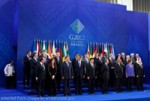G20’s relevance under question, as Russia takes the helm; Russia is leading the G20, but questions stand over the group’s relevance in a time of crisis

(Moscow News – themoscownews.com – Nathan Gray – January 28, 2013)
Russia’s assumption of the chairmanship of the G20 has received a lot of attention since the handover from Mexico at the beginning of December. One of the subjects of discussion at the Gaidar Forum earlier this month was the country’s potential to lead the major economies to solutions to the ongoing economic crisis.
This potential has come into question, however, not so much due to Russia itself, but to structural issues built into the G20 and the nature that the recovery from the crisis has come to take.
“We’ve seen the focus shifting back much more to national or regional initiatives and politics,” said Chris Weafer, chief strategist at Sberbank Investment Research. “We don’t seem to have that coordination within the G20 anymore, it’s more or less become a talking shop.”
Sticking to the basics
The country’s priorities and goals during its chairmanship were outlined in the days following the handover, both in a letter from President Vladimir Putin and in a press conference by Ksenia Yudayeva, the head of the presidential experts’ department and Russia’s personal representative to the G20, or sherpa.
The list determines to tackle larger issues through economic building blocks to develop a foundation for recovery: investment to promote growth and employment, transparency and hence trust in financial markets, and effective regulation, especially in the energy sector.
Russia has come in for praise for its focus on these smaller issues.
“One thing that Russia clearly brings to the G20 and agendasetting is, I think, a function of its experience, and we see this with a lot of emerging markets,” said Jeff Chelsky, senior economist in the international partnerships and policy group at the World Bank, at a Gaidar Forum round table this month. “Understanding that there are micro-economic foundations to a lot of these relationships… I think helps work your way through the forest, so attention to issues like jobs, for example, and human capital development, I think that’s where you’ll find common interests.”
Born in crisis
The G20 was originally created in 1999, in the aftermath of the economic crisis that had erupted in Asia in 1997 and spread to Russia the following year. According to a history of the group, produced in 2007, it represented an acknowledgement of the growth of economies outside the traditional G8, and the need to expand the seats at the world’s financial high table.
Through most of its first decade, it remained a meeting of central bankers and finance ministers. After the collapse of Lehman Brothers in 2008, Sberbank’s Weafer said, the organization underwent a “reinvention,” leading to the establishment of annual leaders’ summits that have become the highlight of the group’s calendar.
The early promise of the reinvented G20, however, soon evaporated as countries shifted away from the coordinated response to the crisis that it launched in April 2009.
“It was a direct response to the escalating or deteriorating situation in the world, obviously from the time of the Lehman’s crisis and the meltdown in the U.S. in later ’08,” Weafer said. “So the first one, the leaders’ summit, was in London, and that was the effective one, because that’s where we saw a coordination agreement on actions to halt deterioration, and they worked, and we had a two-year bull market in equities starting almost from that meeting for the next couple of years, but that was almost like a one-off shot. Since then, they’ve become much less effective, and we have reverted back to more national and regional actions or coordination rather than the G20 level.”
Not under the influence
One of the problems is a lack of authority vested in the G20.
“It’s more a political meeting, just to show the world that something is going on, that we are discussing the problems,” said Darya Pichugina, analyst at Investcafe. “But really, it doesn’t mean a lot, because all the countries are trying to survive themselves, so it’s really not a place to decide anything.”
Pichugina also played down the significance of Russia leading the group this year, in the sense of what it has to offer in terms of guidance to the other countries.
“If we compare the economic conditions in which the world is now, we see that Russia is in quite a good position compared to other countries,” she said. “There was some talk that we would concentrate on the debt problems during the G20 summit, but we really cannot talk about it much, because yes, our debt is low, but it is just because we are in a good position due to high oil prices, so it is quite difficult to say whether we really can influence what is going on in the world.”
Weafer said that the chairmanship does have value as an opportunity for Russia, to show what progress it is making in its own right by the time of September’s summit.
“Hosting the G20 provides the opportunity to create a more positive image of Russia, more positive PR about what the government is doing, provided they actually do something before that,” he said.
For the G20 more broadly, Weafer added, the main benefit was its marginalization of the G8 as a forum for international economic discussions.
